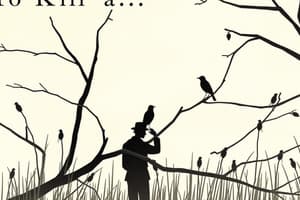Podcast
Questions and Answers
What does Atticus mean when he says it 'seems that only children weep'?
What does Atticus mean when he says it 'seems that only children weep'?
He means that the jury acted unjustly and adults are generally indifferent, while children still feel outrage at unfairness.
What does the loaded kitchen table represent the morning after the trial?
What does the loaded kitchen table represent the morning after the trial?
It represents the appreciation from Maycomb's black community for Atticus's defense of Tom Robinson.
In what way does Jem compare himself to a caterpillar in a cocoon?
In what way does Jem compare himself to a caterpillar in a cocoon?
He feels disillusioned and struggles with the loss of innocence after witnessing the trial's outcome.
What does Miss Maudie mean when she says, 'we're making a step—it's just a baby step, but it's a step'?
What does Miss Maudie mean when she says, 'we're making a step—it's just a baby step, but it's a step'?
What does Dill declare he will be when he grows up, and why?
What does Dill declare he will be when he grows up, and why?
What did Mr. Ewell do to Atticus earlier that morning according to Stephanie Crawford?
What did Mr. Ewell do to Atticus earlier that morning according to Stephanie Crawford?
Study Notes
Chapter 22 Summary
- Atticus observes that only children express outrage at injustice, highlighting adults' apathy and fragmentation in their moral compass.
- The Finch family receives an outpouring of food from the black community, which signifies their gratitude for Atticus’s defense of Tom Robinson; this moment brings Atticus to tears, emphasizing the emotional weight of his efforts and the harsh realities of their situation.
- Jem grapples with disillusionment post-trial; using the metaphor of a caterpillar in a cocoon, he reflects on his lost innocence and the realization that his community is not entirely virtuous, marking a pivotal point in his growth from childhood to adulthood.
- Miss Maudie expresses cautious optimism about Maycomb's racial dynamics, noting efforts by figures like Judge Taylor and Heck Tate to aid Tom Robinson, and points out that the jury’s prolonged deliberation indicates a slight shift in attitudes towards racism.
- Dill decides he will become a clown, influenced by the absurdity of adult behavior, as he remarks on the futility of taking life seriously, opting instead to embrace laughter as a coping mechanism.
- Mr. Ewell confronts Atticus, spitting in his face and issuing a violent threat, showcasing the hostility and danger Atticus faces for standing up against injustice.
Studying That Suits You
Use AI to generate personalized quizzes and flashcards to suit your learning preferences.
Description
Explore the themes and key events of Chapter 22 in 'To Kill a Mockingbird'. This summary highlights Atticus's moral stance, Jem's loss of innocence, and the community’s response to injustice. Delve into Miss Maudie's insights on racial dynamics and discuss the implications of these events.




